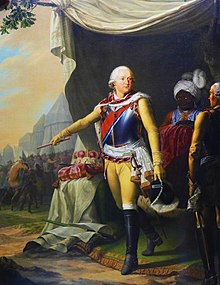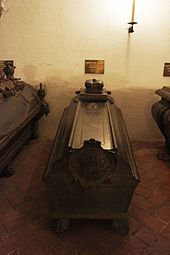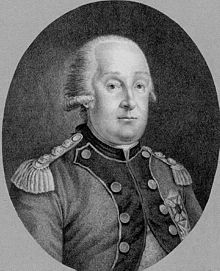Charles II August

Karl II. August Christian (born October 29, 1746 in Düsseldorf , † April 1, 1795 in Mannheim ) was Duke of Pfalz-Zweibrücken from 1775 to 1795 . He spent the last two years of his life in exile in Mannheim, as the French Republic had occupied his principality on the left bank of the Rhine. Charles II August was the older brother of the first Bavarian king Maximilian I Joseph and would have been before him in the line of succession. Although Karl August was not just the second Duke of Pfalz-Zweibrücken with the name Karl, he is referred to as Karl II as a descendant of the line of Karl I. von Pfalz-Zweibrücken-Birkenfeld .
Early years

His parents were the Wittelsbacher Friedrich Michael von Pfalz-Birkenfeld-Bischweiler (1724–1767) and Maria Franziska Dorothea von Pfalz-Sulzbach , a granddaughter of the Palatinate Elector Karl III. Philip . His mother had been cast out "because of her loose lifestyle". Among his tutors were the French theologian Pierre de Salabert and the French officer Agathon Guynement de Keralio .
Karl August intended to marry Maria Amalia of Austria . The Austrian Minister Kaunitz and Maria Theresia rejected the marriage proposal of the politically insignificant prince and instead promised the Archduchess Duke Ferdinand of Parma. Maria Amalia's brother, Emperor Joseph II , endorsed the connection, since Duke Ferdinand was the younger brother of his beloved and early deceased wife Isabella of Parma . When Maria Amalia was informed by her mother about the planned wedding with Ferdinand von Bourbon-Parma, she reacted with fits of screaming and defiant behavior. She had hoped to the end that Maria Theresia would let her choose her husband and that she, like her older sister Marie Christine, could enter into a love marriage.
On February 12, 1774, Karl August, who had since been opposed to Habsburg, married Princess Maria Amalie , daughter of the Saxon Elector Friedrich Christian . She was a cousin of King Louis XVI. of France, King Charles IV of Spain and Empress Maria Ludovica , the wife of Emperor Leopold II. After the wedding, the couple moved to the castle of Neuburg an der Donau .
Duke of Pfalz-Zweibrücken
government
After the death of his uncle Christian IV on November 5, 1775, he succeeded him as the absolute ruler of the Principality of Pfalz-Zweibrücken . His uncle's sons from his marriage to the dancer Marie Anne Camasse (later raised to Countess von Forbach ) were not befitting their rank and therefore not entitled to inheritance.
After taking office, Karl August dismissed the court of his predecessor and initiated austerity measures in order to reorganize the state finances that he had taken over in disarray. At first he resided in Jägersburg Castle in Jägersburg . Two years later he bought the Louisenhof on Buchenberg (today's Karlsberg) near Sanddorf from a cousin of his mistress Caroline Augusta Freiin Gayling von Altheim (1748–1823; she married Ludwig Freiherr von Esebeck in 1776 ) . He had it rebuilt and expanded, and within a few years the Karlsberg Castle , named after him , was one of the largest facilities in Central Europe at the end of the 18th century.
In addition to the castle, a garrison and a landscape park, the Carlslust , with menageries , as well as important collections, including a graphic collection, a weapons collection, a library and a pipe bowl collection, were built on the Karlsberg . In 1779 Karl August moved his residence there.
The painter and general building director Johann Christian Mannlich built an excellent collection of paintings on Karlsberg, which later formed one of the foundations of the Alte Pinakothek in Munich .
In the course of the construction of the palace, which should also clarify Karl August's position as heir to the Electoral Palatinate of Bavaria , the court grew further, expenses rose, and the duke went into debt heavily. The large court, the game fences and par force hunts with the packs of dogs to be fed by the subjects strained the relationship with the subjects.
Heir to the Electoral Palatinate-Bavarian throne
Since Karl August's relative, Elector Karl Theodor von Pfalz-Bayern from the Sulzbach line of the Wittelsbach family, had no legitimate children, Karl August should inherit him according to the Wittelsbach house contracts. With that all Wittelsbach countries would have been reunited. Like Karl Theodor, Karl August descended from Wolfgang von Pfalz-Zweibrücken and was thus his next heir. The only other and non-ruling branch line Pfalz-Zweibrücken-Birkenfeld-Gelnhausen had no political power. Among other things, it was the objections of Karl August by Baron von Hofenfels that prevented Karl Theodor and the Habsburgs from exchanging parts of Bavaria for Upper Austria in 1778/79 , which he should have agreed to as heir according to the house contracts. Together with the elector's widow Maria of Saxony , who continued to reside near Munich, Maria Anna von Pfalz-Sulzbach and Friedrich II. Of Prussia , countermeasures were initiated and so Karl Theodor's plan was later to swap Bavaria in full for the Austrian Netherlands 1784/85 were prevented for the last time and for good. Pfalz-Zweibrücken even joined the Prussian Prussian League of Princes in 1785 . Karl August and his younger brother Maximilian , however, had finally spoiled themselves with Karl Theodor, who looked at his cousins from Zweibrücken with resentment and envy.
exile

After the outbreak of the French Revolution and also after the beginning of the First Coalition War (1792-1797), the Duke stayed in his principality, which was surrounded by French troops, due to the neutrality assured by the French government. After the execution of Louis XVI. Karl August should also be tried in Paris . Before he could be captured by French troops, he was warned on February 9, 1793 by the farmer and postman Nicolaus Pfeiffer from St. Ingbert- Rohrbach , escaped by a hair's breadth and fled to Mannheim via Kaiserslautern. In the following years he lived in Mannheim Castle and in his castle near Rohrbach (Heidelberg) .
The empty Karlsberg Palace was burned down by French troops on July 28, 1793 and was never rebuilt afterwards. Almost the entire furnishings of the Karlsberg had previously been transported to Mannheim by confidants of the Duke, when the Karlsberg had meanwhile been in the hands of the Allies.
Before he could inherit the electoral dignity, Karl August died as a result of a stroke in exile. Since his son died early, his younger brother Maximilian joined the line of succession and finally became Elector Palatinate-Bavarian in 1799 and the first Bavarian King in 1806. Karl August left his brother a mountain of debt of over 9 million guilders.
reception
The duke was portrayed as a despotic ruler during his lifetime. In the first volume of Schlözer's “Stats-Werbung” (1782) an author ( his enlightened comrade, Duke Georg von Sachsen-Meiningen , is said to hide behind the pseudonym Ibrahim Ben Abdallah ) the conditions prevailing in Zweibrücken: “One of our provinces is now whole and even, as it were, a single hunting ground ... The prince placed over this landscape keeps whole regiments of hunting dogs ... The whole country is stunned ”. For Hans Christoph von Gagern , who was familiar with the conditions in Zweibrücken , he was “a dark, voluptuous, stubborn man inclined to harshness; who was otherwise not lacking in feeling of his status, his duties as a count palatine, nor in determination. ”His building director Johann Christian von Mannlich describes the prince hardly more positively in his memoirs. In retrospect, the ruler of Zweibrücken became the epitome of the absolutist despot and tyrant for the democrats. In 1923, after the fall of the monarchy in Bavaria, the local historian Fritz Schunck made known the prince's name, which has since spread widely: Hundskarl .
progeny
- Karl August Friedrich, Hereditary Prince of Pfalz-Birkenfeld-Zweibrücken (* March 2, 1776, † August 21, 1784); Gravesite: Alexander Church (Zweibrücken)
ancestors
| Christian II of Pfalz-Zweibrücken-Birkenfeld (1637–1717) | |||||||||||||
| Christian III of Pfalz-Zweibrücken (1674–1735) | |||||||||||||
| Katharina Agathe von Rappoltstein (1648–1683) | |||||||||||||
| Friedrich Michael of Pfalz-Birkenfeld-Bischweiler (1724–1767) | |||||||||||||
| Ludwig Kraft of Nassau-Saarbrücken (1663–1713) | |||||||||||||
| Caroline of Nassau-Saarbrücken (1704–1774) | |||||||||||||
| Philippine Henriette zu Hohenlohe-Langenburg (1679–1751) | |||||||||||||
| Charles II August | |||||||||||||
| Theodor Eustach of Pfalz-Sulzbach (1659–1732) | |||||||||||||
| Joseph Karl von Pfalz-Sulzbach (1694–1729) | |||||||||||||
| Marie Eleonore of Hessen-Rotenburg (1675-1720) | |||||||||||||
| Maria Franziska von Pfalz-Sulzbach (1724–1794) | |||||||||||||
| Charles III Philipp Elector Palatinate (1661–1742) | |||||||||||||
| Elisabeth Auguste of the Palatinate (1693–1728) | |||||||||||||
| Ludwika Karolina Charlotte von Radziwiłł-Birze (1667–1695) | |||||||||||||
Trivia
The Homburg brewery, founded in 1878, is named after the castle Karlsberg Brewery (not to be confused with the Danish brewery, which is written with a "C") and uses the portrait of Karl on every beer bottle.
literature
- Karl Theodor von Heigel : Karl August, Count Palatine near the Rhine, Duke of Zweibrücken . In: Allgemeine Deutsche Biographie (ADB). Volume 15, Duncker & Humblot, Leipzig 1882, pp. 336-338.
- Rainer Marx: The Karlsberg and Karl II. August in literature . Saarpfalz - Sheets for history and folklore, special issue 2010, Homburg 2010
- Eberhard Weis: Charles II August. In: New German Biography (NDB). Volume 11, Duncker & Humblot, Berlin 1977, ISBN 3-428-00192-3 , pp. 258-260 ( digitized version ).
- Literature on Karl II. August in the Saarland Bibliography
Web links
supporting documents
- ^ Eduard Vehse : History of the courtyards of the houses in Baiern, Würtemberg, Baden and Hesse , Part 2, Hamburg 1853, pp. 251-256. On-line
- ↑ Ibrahim Ben Abdallah (pseudonym), Fez and Marocco, May 1782 (fictitious). In: August Ludwig von Schlözer : Stats ads , Volume 1, Göttingen 1782, p. 59. Online
- ↑ Hans Christoph Ernst von Gagern : My share in politics: Under Napoleon's rule , Volume 1, Stuttgart and Tübingen 1823, p. 15. Online
- ^ Johann Christian von Mannlich : Histoire de ma vie . Ed .: Karl-Heinz Bender and Hermann Kleber, 2 volumes, Trier 1989–1993 ISBN 3-87760-700-4 .
- ^ Rainer Marx: The Karlsberg and Karl II. August in literature . Saarpfalz - Sheets for history and folklore, special issue 2010, Homburg 2010, p. 23.
| predecessor | Office | successor |
|---|---|---|
| Christian IV |
Duke of Pfalz-Zweibrücken 1775–1795 |
Maximilian Joseph |
| personal data | |
|---|---|
| SURNAME | Charles II August |
| ALTERNATIVE NAMES | Charles II August Christian; Charles III August Christian; Hundskarl |
| BRIEF DESCRIPTION | Duke of Pfalz-Zweibrücken |
| DATE OF BIRTH | October 29, 1746 |
| PLACE OF BIRTH | Dusseldorf |
| DATE OF DEATH | April 1, 1795 |
| Place of death | Mannheim |

